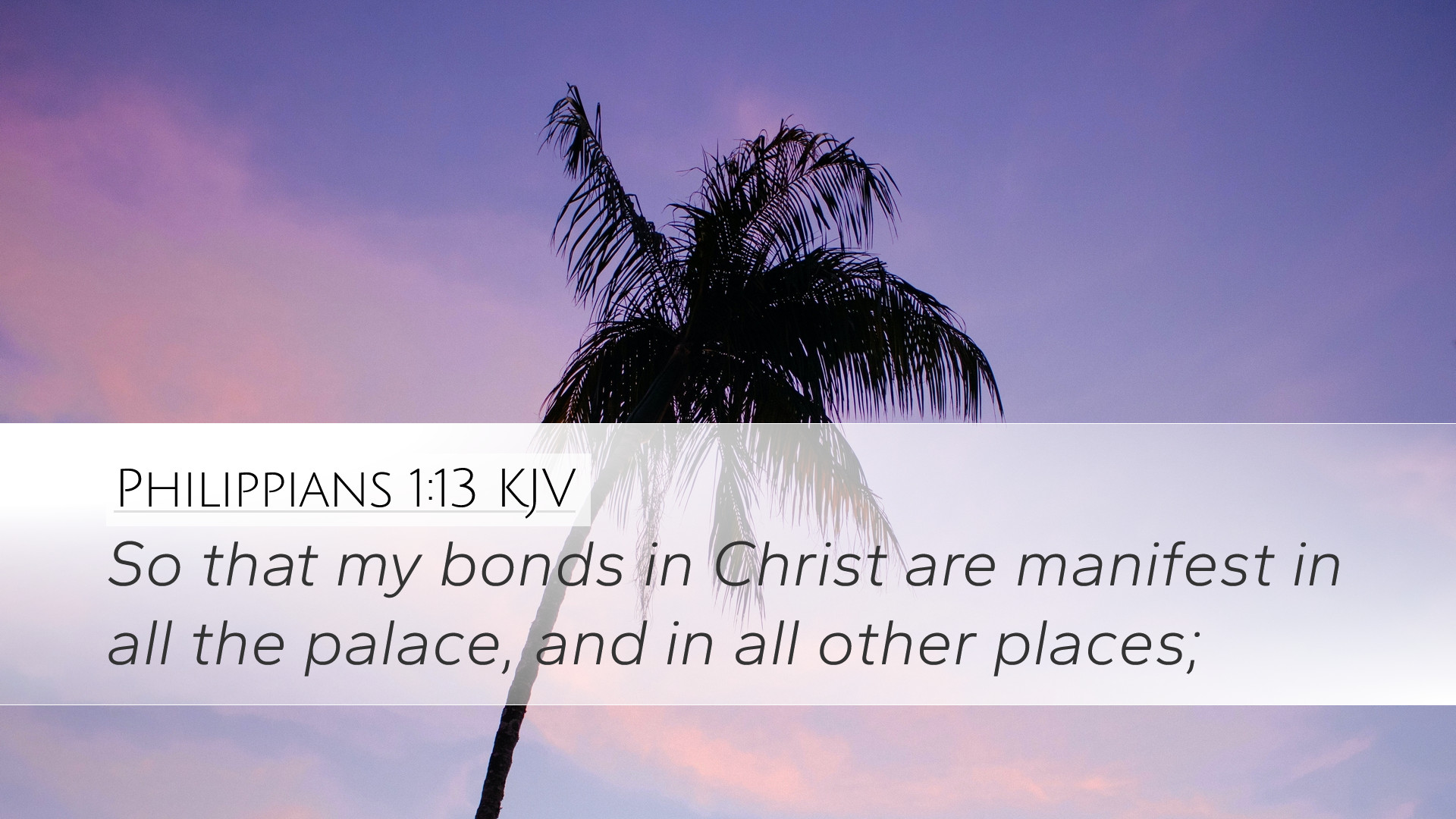Commentary on Philippians 1:13
Philippians 1:13 states: "So that my bonds in Christ are manifest in all the palace, and in all other places." This verse showcases the Apostle Paul's reflections during his imprisonment and the impact of his circumstances on the spread of the Gospel. The following commentary synthesizes insights from notable public domain commentaries, including those by Matthew Henry, Albert Barnes, and Adam Clarke.
Contextual Background
Before analyzing the verse, it is critical to understand the context of Paul's imprisonment. He wrote this epistle while incarcerated, likely in Rome, facing potential execution. Despite these dire conditions, Paul’s letters are filled with joy and confidence in the progress of the Gospel.
Historical Significance
Paul's imprisonment serves a dual purpose in his ministry. Not only does it allow him to minister directly to those who guard him and to other prisoners, it also cultivates an environment where the message of Christ could spread in a unique way within the palace itself.
Verse Analysis
Paul's Bonds
“So that my bonds in Christ are manifest...” This phrase is crucial as Paul draws attention to his condition as a servant of Christ. The use of “bonds” represents not only physical restraint but also his spiritual commitment to Christ. Paul identifies his imprisonment as being 'in Christ,' showcasing that his identity and purpose are found in relation to Jesus.
Witness in the Palace
“...in all the palace, and in all other places.” Here, 'the palace' refers typically to the imperial guard or the palace of Caesar. Paul implies that his presence, even while in chains, has allowed the Gospel to penetrate the very heart of Roman authority. Matthew Henry notes that Paul’s chains served as a counteractive force against the misrepresentation of the Gospel, demonstrating that the Gospel can thrive even amidst oppression.
The Spread of the Gospel
Albert Barnes highlights that the evangelistic success of Paul’s imprisonment proves that circumstances do not determine the power of the Gospel. Instead, the mention of “all other places” suggests the broader audience impacted by his chains, indicating a ripple effect as his fellow believers find courage to speak boldly.
Theological Implications
The theological richness of this verse encompasses several critical themes.
- God’s Sovereignty: Paul's chains are purposed by God for the advancement of the church.
- Faithfulness in Trials: The example Paul sets in adversity encourages believers to remain steadfast in their own trials.
- Witnessing Opportunities: Even in discouraging circumstances, believers are called to share the hope of the Gospel wherever they are.
Application for Today
The message contained in Philippians 1:13 resonates deeply in today’s context, serving as a reminder of how God can use even the bleakest of situations to bring glory to His name. Pastors and theologians can draw on Paul’s experiences to encourage congregants facing their own challenges.
Encouragement for Leaders
For church leaders, Paul’s resilience reinforces the importance of sharing the Gospel irrespective of personal struggles. Adam Clarke articulates how leaders can utilize their challenges to connect with others, reflecting Christ’s love even in periods of personal suffering.
Encouragement for Believers
For lay believers, the encouragement lies in recognizing that their circumstances may effectively serve as platforms for divine influence. Every person, regardless of their situation, can become a witness for Christ, just as Paul did through his imprisonment.
Conclusion
Philippians 1:13 stands as a powerful testament to the relentless nature of the Gospel and the providential hand of God. Through Paul's experience, we learn that our struggles can be transformed into powerful testimonies that reach far beyond our comprehension. The challenge for today’s believers is to embrace their circumstances and to see how God might use them to manifest His glory and grace in the world.


